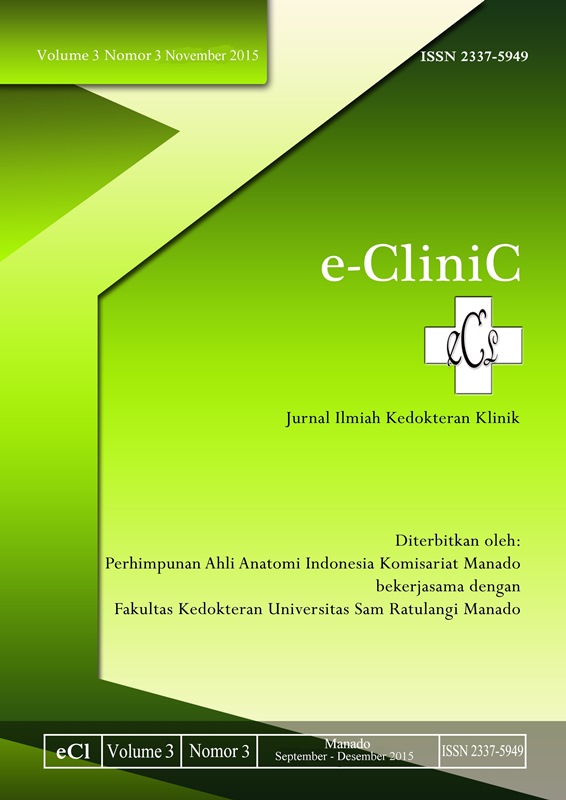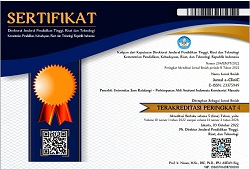PERBANDINGAN FUNGSI KOGNITIF SEBELUM DAN SESUDAH DIALISIS PADA SUBJEK PENYAKIT GINJAL KRONIK YANG MENJALANI HEMODIALISIS
DOI:
https://doi.org/10.35790/ecl.v3i3.10156Abstract
Abstract: Chronic Kidney Disease (CKD) is a pathophysicological process with various causes, resulting in the decline of progressive kidney function and in kidney failure. Currently, CKD cases are rising quickly particularly in developing countries and have become the main health problem worldwide because it has been the risk factor of cardiovascular diseases. CKD can cause failure of organs due to the increased toxin level. The increase of blood ureum level could harm all cells, including neuron cells. One of the therapies of CKD is hemodyalisis. This study aimed to obtain the ratio of cognitive function before and after undergoing hemodyalisis among CKD patients. This was a descriptive study using the primary data obtained directly from the patients undergoing hemodyalisis at the hemodyalisis unit, Department of Internal Diseases Prof. Dr. R. D. Kandou Hospital, Manado. The population in this study was patients who had undergone hemodyalisis more than 208 times or for 2 years and had met the inclusion criteria. The results showed that CDK male patients were 43,3% and female patients 56,7%. Before undergoing hemodialysis, the average ureum level was 124.7, and after undergoing hemodyalisis, the average ureum level was 97.3 with 20.4% Urea Reduction Rate (URR). Before undergoing hemodialysis, the average cognitive function was 27.6, and after hemodialysis, the average rate was 28,6. Conclusion: There was a significant decrease of average blood ureum level and a significant increase of cognitive function among CKD patients who had undergone hemodyalisis.
Keywords: chronic kidney disease, hemodyalisis, ureum, cognitive function
Abstrak: Penyakit Ginjal Kronik (PGK) adalah suatu proses patofisiologi dengan penyebab yang beragam, mengakibatkan penuruan fungsi ginjal yang progresif, dan biasanya berakhir dengan gagal ginjal. Kasus Penyakit Ginjal Kronik saat ini meningkat dengan cepat terutama di negara-negara berkembang dan telah menjadi masalah utama kesehatan di seluruh dunia karena merupakan faktor resiko terjadinya penyakit jantung dan pembuluh darah. PGK dapat mengakibatkan peningkatan kadar ureum dalam tubuh yang dapat merusak semua sel termasuk sel neuron. Penelitian ini bertujuan untuk mengetahui perbandingan fungsi kognitif sebelum dan sesudah dialisis pada pasien PGK. Penelitian ini mengguakan metode deskriptif berdasarkan data primer yang didapatkan secara langsung dari pasien yang menjalani terapi hemodialisis di Unit Hemodialisis Bagian Ilmu Penyakit Dalam RSUP Prof. Dr. R. D. Kandou Manado. Populasi penelitian yaitu pasien PGK yang telah menjalani terapi hemodialisis. Hasil penelitian menunjukkan bahwa pasien PGK berjenis kelamin laki-laki sebesar 43,3% dan perempuan sebesar 56,7%. Sebelum menjalani hemodialisis nilai rerata ureum 124,7 dan sesudah nilai rerata ureum menjadi 97,3 dengan rerata Urea Reduction Rate (URR) 20,4%. Sebelum menjalani hemodialisis rerata fungsi kognitif 27,6 dan sesudah hemodialisis rerata menjadi 28,6. Simpulan: Terjadi penurunan bermakna dari nilai rerata ureum serta terjadi peningkatan bermakna dari nilai rerata fungsi kognitif sesudah pasien PGK menjalani hemodialisis.
Kata kunci: penyakit ginjal kronik, hemodialisis, ureum, fungsi kognitif
Downloads
How to Cite
Issue
Section
License
COPYRIGHT
Authors who publish with this journal agree to the following terms:
Authors hold their copyright and grant this journal the privilege of first publication, with the work simultaneously licensed under a Creative Commons Attribution License that permits others to impart the work with an acknowledgment of the work's origin and initial publication by this journal.
Authors can enter into separate or additional contractual arrangements for the non-exclusive distribution of the journal's published version of the work (for example, post it to an institutional repository or publish it in a book), with an acknowledgment of its underlying publication in this journal.
Authors are permitted and encouraged to post their work online (for example, in institutional repositories or on their website) as it can lead to productive exchanges, as well as earlier and greater citation of the published work (See The Effect of Open Access).







